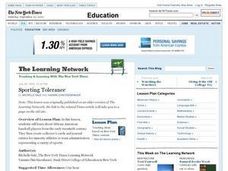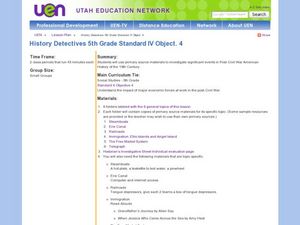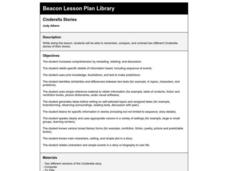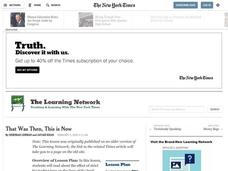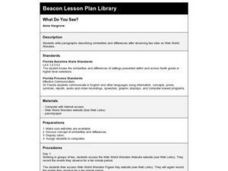Curated OER
Government Gripes
Students, in groups, investigate the purpose and jurisdiction of government agencies assigned to regulate different science/technology/health issues, then describe situations in which agencies might have a disagreement, and stage a mock...
Curated OER
Sporting Tolerance
Students investigate African-American baseball players from the early 20th century. They read an article, answer discussion questions, write a journal entry, and create a poster-size baseball card for an athlete.
Curated OER
Let the Music Play
Students create auditory presentations on festivals and celebrations around the world. They begin by reading about how the New Orleans high school marching bands have overcome many obstacles to keep their music traditions alive. Then...
Curated OER
Making the Future Present
Students draw and describe a new system for prison surveillance. After reading an article, they discover the use of a wearable computer by prison guards. In groups, they develop a proposal for a new type of technology to be used in a...
Curated OER
Post-Civil War American History
Fifth graders examine significant events in Post-Civil War America. In this Post-Civil War lesson, 5th graders investigate the important events after the war in 19th century America. They read primary source documents about six topics...
Curated OER
Nutrients
Fourth graders understand the important nutrients in food and the value of each. In this nutrients instructional activity, 4th graders complete a chart giving examples of foods that contain that nutrient and a definition of the nutrient....
Curated OER
Reach for the Stars
Students investigate the Underground Railroad. In this slavery lesson plan, students read books about slavery, the Undeground Railroad, and how slaves escaped the south. Students develop knowledge about coded songs and constellations...
Curated OER
Australian Animals Internet Hunt
In this online/interactive worksheet about animals in Australia, students read questions which include links to the internet, click on the links to discover the answers, and write the answers. Students write 21 answers. Additional...
Curated OER
We, the First People
Students explore new support regarding the earliest peopling of America by examining multiple theories on the migration of the first people to America, investigating related archaeological finds, and creating research-based scientific...
Curated OER
Political Race
Young scholars explore political topics and issues that often involve discussions of race or ethnicity. They develop campaign speeches voicing their stances on their assigned topics and explore how their racial and/ or ethnic backgrounds...
Curated OER
WorldWatcher Project: Global Warming Project
Young scholars conduct lab activities, computer visualizations, and other various forms of research in preparation for a role-play activity in which they assume the identities of advisors to various heads of state on the subject of...
Curated OER
It's Up for Debate
In this lesson, students investigate the different platforms of each of the Presidential hopefuls for the 2000 election. Small groups each carefully research the platforms of an assigned candidate and then create a political pamphlet...
Curated OER
Solve a Mystery
Fourth graders use text clues to solve mysteries. In this text clue/mystery solving lesson, 4th graders access a teacher assigned web site, Cyberkids.com, where they solve a mystery. They read chapters of, Encyclopedia Brown, and work...
Curated OER
Project Whistlestop:Missouri Vacation Learning Unit
Fourth graders reserach the state of Missouri. For this Missouri History lesson, 4th graders plan a vacation to a region of Missouri. Students work in collaborative groups to determine all aspects of the trip. Students use math skills...
Curated OER
Cinderella Stories
Students read and compare Cinderella stories using a worksheet. They write and illustrate original tales with a twist.
Curated OER
Current Contexts
Young scholars examine how they are affected by world affairs. After reading an article, they examine Otto Frank's attempts to immigrate to America. Using the New York Times, they identify examples of news, advertisements and...
Curated OER
Literature Circles in Action
Students form cooperative groups to read, discuss, and respond to a novel. They select a novel from offered choices or by criteria given by teacher and complete a culminating project on the novel from such choices as: creating a...
Curated OER
The Cay: Creatures of the Coral Reef
Students make a connection between science and literature. After reading the first five chapters of the novel The Cay, they describe the physical characteristics of a coral reef, as well as describe and distinguish between the many...
Creative Educator
Amazing Animal Alliterations
Creatures can cause creativity! Alliteration can make writing more enjoyable and entertaining. Help your pupils grasp this concept by using animals as inspiration for alliterative sentences. Prepare your class for the activities by first...
Curated OER
The Renaissance Person: composing an Extended Definition Essay
Students recognize the characteristics of an extended definition. In this Renaissance person lesson, students read a collection of short stories. Students research the definitions of Renaissance and Renaissance person. Students write...
Curated OER
Muggie Maggie - Lesson 6
Third graders read chapter 6 of Beverly Cleary's, Muggie Maggie, and complete associated activities. In this Muggie Maggie activity, 3rd graders complete vocabulary work. They examine punctuation marks used in the chapter, and make a...
Curated OER
That Was Then, This is Now
Students read about the effect of strict fur trading laws on the lives of the Inuit people in Canada, then use print and digital resources to compare past and present-day ways of life of several indigenous peoples around the world.
Curated OER
Dealing with Differences
Students list at least ten things they have a hard time doing. After reading and discussing Be Good to Eddie Lee, Students, in cooperative groups, write at least six ways people can assist people with disabilities.
Curated OER
What Do You See? (Web World Wonders)
Fourth graders write paragraphs describing similarities and differences after observing two sites on Web World Wonders. They read their paragraphs to the class for critique.



